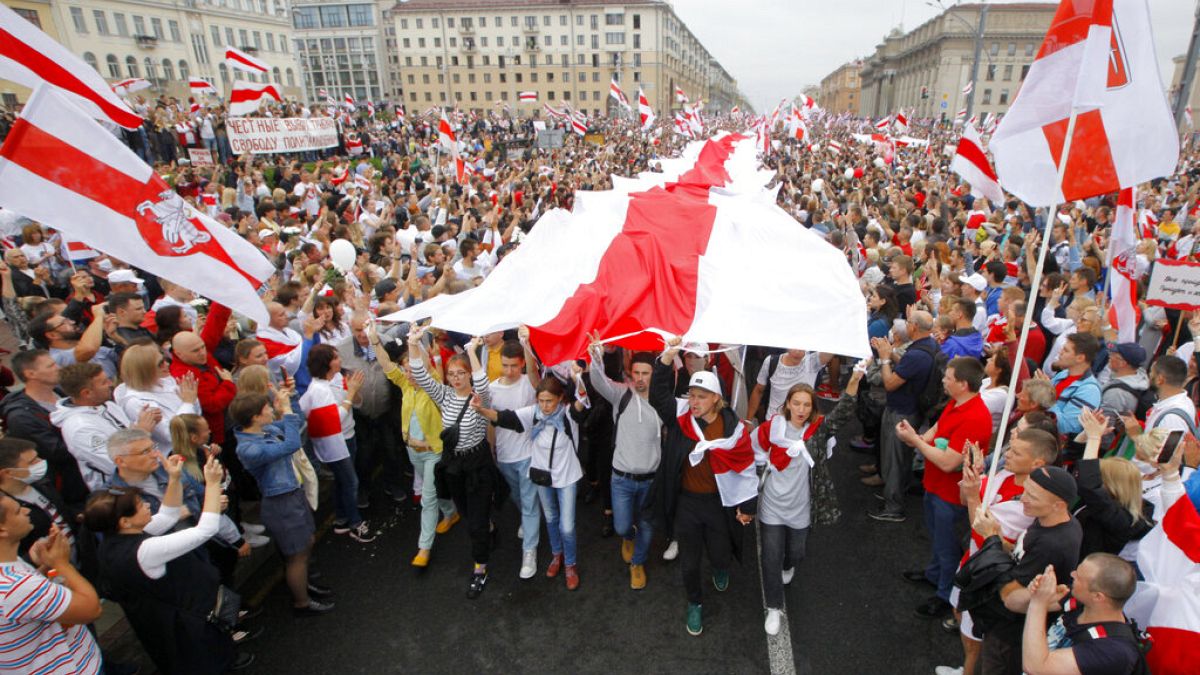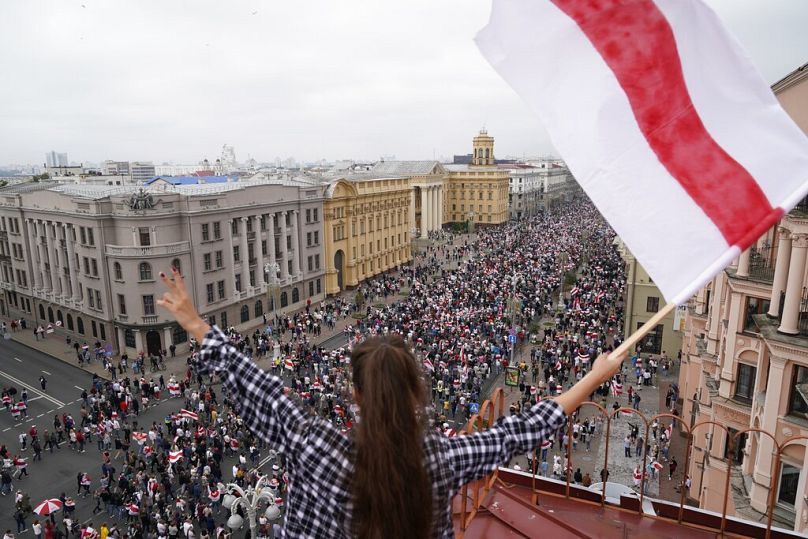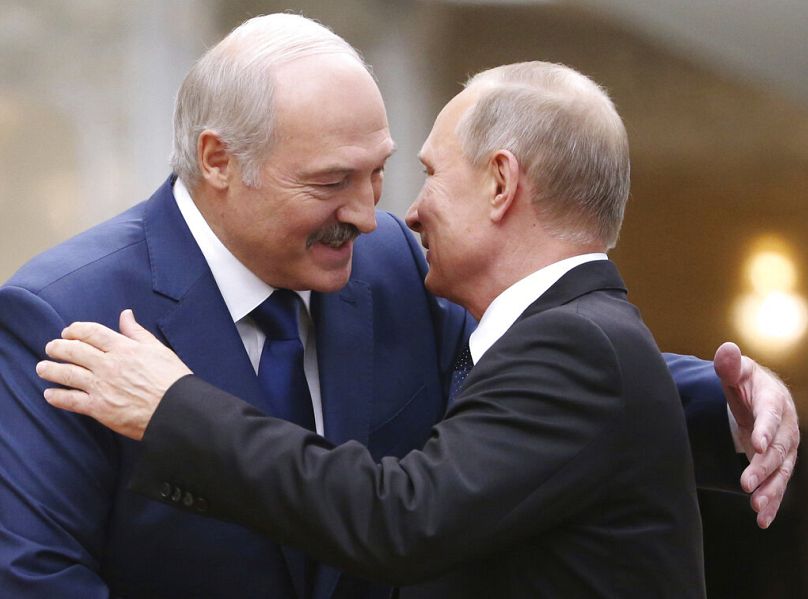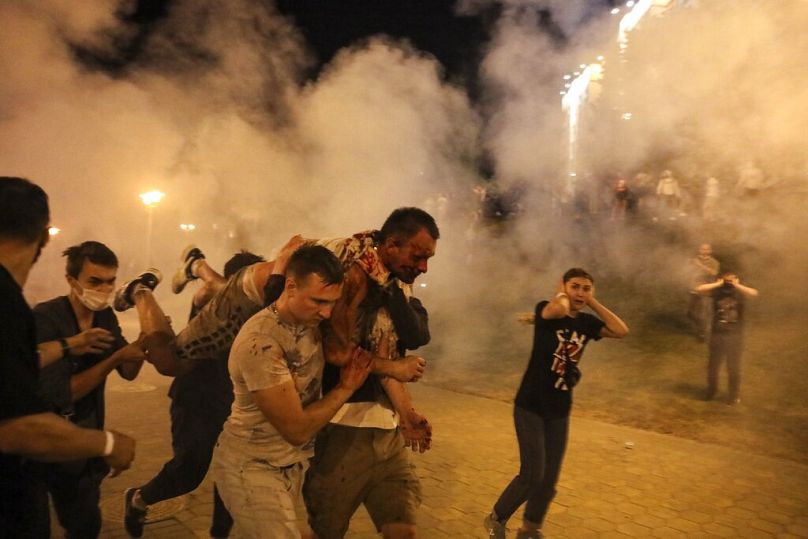"Some people think we [Belarusians] are dangerous," said one dissident. "Its discrimination".
As massive anti-government protests were crushed between 2020 - 21, hundreds of thousands of Belarusians left their country, facing a whirlwind of repression and violence at home.
A mix of students, activists and political opponents of President Alexander Lukashenko’s oppressive regime, most escaped to neighbours Poland and Lithuania, their first points of safety.
And there they stayed.
If they go back, many of those opposed to Europe’s "last dictator" would face arrest, imprisonment or worse.
“We are here because we don't have a choice”, said Alexey Yevtushik, a Belarusian activist.
The 37-year-old escaped to Lithuania two years ago, after being arrested at a demonstration in his homeland. He says he was imprisoned and tortured by police, leaving him little choice but to flee.
Yet, since the war in Ukraine, Belarusian exiles like Yevtushik say they are facing growing discrimination and hostility in the European Union, shouldering blame for Belarus's emphatic support of Russia.
It manifests in many ways. European universities and landlords have reportedly refused to accept Belarusians, while some companies are no longer hiring them.
And Sweden and the Czech Republic have been criticised for trying to deport Belarusian asylum seekers, despite the risk of the death penalty back home.
‘Ignorance and indifference’
This new wave of ill-feeling since Russia's invasion of Ukraine in February 2022 fails to recognise that Belarusians overwhelmingly disapprove of their leader Lukashenko and the war in Ukraine.
Polling by an independent Belarusian sociologist Andrei Vardomatsky found that only 11% were in favour of Belarus participating in the fighting.
Meanwhile, two-thirds of those surveyed are against Russia’s use of Belarus as a staging point from which to conduct military operations in Ukraine.
“Some people think we are dangerous, like some kind of enemy,” Yevtushik told Euronews, recalling a recent incident in which some "drunk guys" asked him if he "loved Putin".
“It's discrimination. Belarus is participating in this war on Russia’s side, but it's not us, it's our stupid dictator.”
Still, he continued: “Even if there are problems here, it is better than living in a prison. That’s the choice we face: Prison or freedom”.
Part of the problem impacting Belarusian exiles in Europe is common misperceptions.
According to Andrei Vazyanau, a lecturer at Vilnius' European Humanities University, in countries not bordering Belarus, public attitudes are shaped by a “colonial vision” promoted by Moscow, which obscures the fact that Belarus is distinct from - and resists - Russia.
“People are usually indifferent because they don't see Belarus as a separate,” he says.
Belarus, meaning white Russians, was part of the USSR until its dissolution in 1991. Though its government shares deep economic and political ties with Russia, the country has its own distinct culture and history.
In February, a leaked document showed Putin's plans to annex Belarus by 2030. If this were the case the EU would share an extensive border with Russia.
‘Nobody discriminates against Belarusians more than the Belarusian government’
Even in Lithuania, one of the principal allies of the Belarusian opposition, the "mood is changing", says Vazyanau.
The government proposed banning Belarusians and Russians from obtaining Lithuania citizenship, though rowed back on this in March.
“It was a symbolic humiliation,” Vazyanau told Euronews. “People were outraged to see themselves put with Russians in one norm.”
He said anti-European elements in Russia and Belarus were seizing on policies like this to mock dissidents, claiming it showed Europe would give them “nothing”.
“People are disappointed at the very idea of international solidarity,” he explained. “They feel betrayed on so many levels.”
“It's not this that makes Belarusians enthusiastic about Russia because Moscow is also not doing anything good to Belarus, it's that people get disappointed in Western democracies.”
Although Lithuania has done more than any country to help Belarus, allowing dissidents to set up within its borders, Vazyanau says opinion is divided on the “Belarusian question”.
“On the one hand, Lithuania has seen the massive repression of civilians in Belarus. It has this ambition of promoting democracy, showing solidarity and being faithful to its values”.
“On the other, it is a small country and is afraid of the threats of special agents and spies that can infiltrate. Other European countries don't face this issue”.
There are 40,000 Belarusian citizens in Lithuania, according to the Eastern Europe Studies Centre. Some 86% of respondents in their survey said they left Belarus for political reasons.
‘No freedom without blood’
Attitudes towards Belarusians have been hugely influenced by the Russian invasion of Ukraine.
Outraged Belarusians took to the streets days after Russian tanks rolled across the border and more than 1,500 people have been arrested for anti-war actions.
Meanwhile, three Belarusian regiments are reportedly fighting for Ukraine.
Still, parts of its territory were used to stage the invasion, while Moscow’s troops are now training in Belarus – sparking fears Belarus will get dragged into the war.
Some Ukrainians have lambasted the Belarusian population for not challenging Lukashenko violently, invoking their own 2014 revolution that saw Putin-ally President Viktor Yanukovych deposed after deadly clashes between protesters and state forces.
For Vazyanau, this is an unfair criticism.
Not only does Ukraine have a "story of successful protest" – capable of inspiring resistance – the situations in each country are not comparable, he says.
Demonstrations in Belarus were ruthlessly and brutally suppressed with help from the Kremlin, with many suggesting Lukashenko only survived because of Putin's intervention.
Plus there was "no international support” for protesters in Belarus, he said. “Some countries helped people escape the violence, but no country helped the fight back.”
“We were counting on solidarity in 2020.”
More than 250,000 people gathered in the streets of Minsk, the Belarusian capital, two years ago, demonstrating against the allegedly fabricated results of presidential elections, which saw Lukashenko declared the winner.
It was the largest protest movement in Belarus’s modern history.
Believing that “everyone would benefit” if Belarus was independent, Vazyanau told Euronews: “One thing rights defenders and those engaged in partisan struggles need is a changed visa policy, making it easier for Belarusians to travel to the EU.”
“There are many inside Belarus who are doing something to support Ukraine and resist the occupation of their country. But they are devoid of support."
“I think this is what Europe can – and should – do.”



